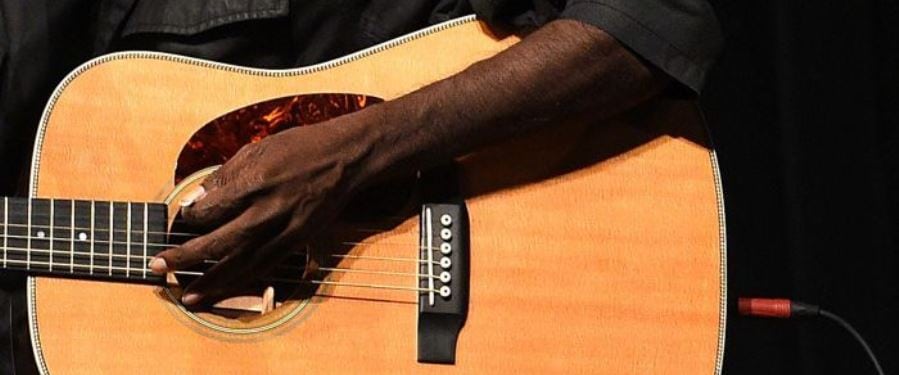Dr G Yunupingu, who passed away last month aged just 46 as a result of kidney disease, was born blind and yet he could see through time and space, and play pool with the planets.
His odyssean songlines ached with beauty and haunting lamentations.
They caressed the universe, summoning the metaphysical, stirring the senses, awakening the imagination of the listener.
In mystical alchemy, there was fusion between the ancient and the present; in melodies both lullaby and hymn and in earlier days, in particular, a war cry.
Before his solo career, he was part of the landmark iconic Indigenous band, Yothu Yindi. To this day, the soul-teasing thumping of ‘Treaty’ and its amalgam of modern and traditional, remains an anthem for black and white alike.
This land was never given up
This land was never bought and sold
The planting of the Union Jack
Never changed our law at all
~ Lyrics from the ‘Treaty’, by Yothu Yindi
Dr Yunupingu was music’s time lord.
He took us from the Dreamtime to Greenwich Mean Time with the mere pluck of a guitar string.
It was as if the earth itself hummed his voice; sometimes there was the visceral timbre of the hypnotic didgeridoo; at other times, the operatic grandeur and tempered restraint of a tenor or ecclesiastical Gregorian chant.
There was a heroic grandeur in the purity of his unadulterated voice, sourced in the millennia of totems not only his immediate family, but also, generously, the wider human family, often collaborating with other famous international artists as easily as he performed with locals at the local pub.
He was surely a gift from the universe. Yunupingu sings of how he was carried by Mother Wititj, the wondrous Rainbow Serpent and how he was himself a child of the rainbow. Who could doubt it. He wore a coat of many vocal colours.
His other worldliness, his invocations and incantations, seemed to kiss away those salty tears that roll down the cliff face of a lonely, wounded and choking earth, wiping away the toxic rain beating upon the glass skins of skyscrapers that claw the skies, looking upon nature and her destroyers with disdain from the lofty heights and glazed windows above the likes of Wall and Collins Streets and the tent city of today’s homeless in moneyed Martin Place, where the fat walleted executives of the Reserve Bank across the road have to wince and mince their way through the squatting great unwashed. That’s ASX life in the city. Keeping the disinterested rates forever on hold.
Homelessness is not just happening in the UK… ‘Tent city’, the homeless camp in Sydney’s Martin Place https://t.co/VkWIlCwJyt pic.twitter.com/dbHGkJPBTJ
— I was a JSA claimant (@imajsaclaimant) August 4, 2017
Dr Yunupingu, who died last month, lived between Uluru rock and a heart place.
He was merely 46 years old and died fulfilling, not the Australian Dream, but the Indigenous Nightmare of statistical premature death, diseased bodies and the continuing genocide of our First Nations through neglect and disadvantage, and myriad shameful abuses of human rights and social justice.
Just weeks before the Uluru Convention for a Makarrata Commission issued its profound Uluru Statement from the Heart and, earlier this week, the now disbanded Referendum Council’s final report was released by the Prime Minister. It recommends a Constitutionally entrenched “Voice to Parliament” in the form of a national Indigenous representative body.
Awarded an honorary doctorate by the University of Sydney, Dr Yunupingu was revered around the globe. He won a swag of national and international awards. No Indigenous musician has sold more “records” than he, nor sung more songs in language.
He performed for President Barack Obama and, graciously, for a Queen whose antecedents and representatives lied and seized Australia for themselves falsely claiming it terra nullius.
His words, melodies and tribal language transcended the dead seas and dying poisoned reefs, river water thieves, voluptuous tropical rain forests, wind-whipped deserts and zinc-lipped white beaches of our temperamental and tempestuous feral continent that we have long defiled and subjected to environmental abuse and homegrown domestic eco-violence.
A Yolngu man, he was born in Galiwin’ku, the largest aboriginal settlement on Elcho Island off the coast of Arnhem Land in the Northern Territory. Until 1974, the Island was a Methodist Mission.

An historical photo of earlier citizens of Dr Yunupingu’s beloved Elcho Island standing behind the fully clad journalist Henry Boote. (Source: Pastmasters)
The Island has given us many wonderful musicians and artists and was the inspiration for Neil Murray’s beautiful homage ‘My Island Home’, initially written for and recorded by the acclaimed Warumpi Band, later becoming a greater smash hit for Christine Anu, who sang it for the closing ceremony of the Sydney Olympics that starred another famous Indigenous Australian, gold medallist champion sprinter Cathy Freeman, who broke records of another kind.
It was the Warumpis who made history by becoming the first rock band that wrote and recorded language. Tellingly, that first song was ‘Jailanguru Pakarnu’ (Out From Gaol).
Like Yunupingu, the band’s mesmerising frontman and didgeridoo player, George Rrurrambu (after his early death at 50 in 2007 he became known as George Rrurrambu Burarrwanga) was a Yolngu man from Elcho Island.
Our Indigenous brothers and sisters have a life expectancy that is ten years less than other Australians. Mortality rates are inexcusable.
For decades we have known this. You would have thought that the ambiguous circumstances of Dr Yunupingu’s death would have sparked national non-partisan debate and a renewed commitment to act — and not just mouth platitudes and run sand through fingers for a photo shoot. It did for about five minutes.
The Australian Human Rights Commission’s discussion on the Close the Gap: Indigenous Health Campaign should be compulsory reading for our parliamentarians. Clearly it isn’t.
And so should be the campaign’s 2017 Budget Position paper that lists nine priorities to close the cavernous gap in health inequality for Aboriginal and Torres Strait Islander peoples.
Tens of thousands of Indigenous Australians are refugees in their own country.
Dr Yunupingu died a needless death after a life of inhuman treatment. We must close the gap now https://t.co/hOwPbYCP8s via @ABCNews
— Janette Milera ???????? (@OriginalAussie) July 29, 2017
In an opinion piece for the ABC, Professor Jakelin Troy, Director of Aboriginal and Torres Strait Islander Research at the University of Sydney, wrote:
Growing up as an Aboriginal child in remote Australia, Dr G Yunupingu was less likely to receive the basic health care that other Australian children enjoy.
As an adult he suffered from complications of hepatitis B, a disease that can be avoided by a simple vaccination.
We lost an inspiring and compassionate leader, an artist and advocate for our endangered Australian languages because his health was compromised through entirely preventable diseases.
…. He was also the victim of persistent racism, often treated poorly in wider society, turned down when attempting to take taxis and left to wait longer than seemed necessary to receive medical attention when he was suffering acute incidents such as major internal bleeding.
Instances of neglect and rejection were reported by his colleagues in the music industry.
…. Mental trauma sustained by even “micro” racist incidents is known to have a direct effect on the wellbeing of Aboriginal people.
Dr Yunupingu’s lifelong friend, Vaughan Williams, a homeless outreach worker for the Larrakia Nation Aboriginal Corporation in Darwin went in search of his mate, after he’d been alerted by a health worker that the musician had missed several kidney dialysis appointments.
He told the ABC he found Dr Yunupingu laying in a sand dugout on a Darwin beach, living in a camp for itinerants and surrounded by drinkers:
“When I found him in this camp I was absolutely appalled at the state he was in because I’d known him since he was a teenager.”
Vaughan Williams and another lay a remembrance to Dr Yunupingu at the Darwin beach where they brought him to hospital (Image by Jane Bardon for ABC News)
He said the musician had wasted away. He came back with some of Yunupingu’s friends the next day and they took him to Darwin Hospital. He died not long afterwards.
He shouldn’t have missed one renal appointment. He shouldn’t have died.
He should have been in that hospital weeks before we managed to get him in there, and how that didn’t come about is what I’m questioning right now.
We owed him a better effort. We owed him our compassion. And as a society we should be thinking: how did it come to this?
That this amazing man with the disability of blindness, who achieved so much was here on this lonely stretch of Darwin coastline, dying, with people drinking around him.
And he shouldn’t have died. The Yunupingu name is artistic royalty; like the Redgraves in Britain.
But that doesn’t mean he should have been accorded extra consideration. No. He should have been given equal consideration.
Listen up. Going through dialysis isn’t easy. Say you have to do it three times a week — and the nearest machine is in Darwin. What if you live hundreds of miles away in a remote community?
What if you live on Elcho Island — or one of the other islands. Where do you stay in between treatment? How can you afford to stay in a hotel or any other form of accommodation?
This is 101 basic common sense. But who cares? Does Minister for Indigenous Affairs Nigel Scullion care? Never mind the accolades about Dr Yunupingu. What about access to healthcare ?
Why can’t we have a fleet of pick-up vans for those in outback areas who need ferrying to and fro?
And an accommodation lodge near the hospital, where patients can stay?
Yesterday, the Garma Festival of Traditional Culture started under the auspices of the Yothu Yindi Foundation and runs through to Monday. It’s theme is “makaratta“, an ancient traditional Arnhem Land Yolngu ceremony that ameliorates conflict and helps to create peace.
Tribute was made in the opening ceremony to Dr Yunupingu, attended by both Prime Minister Malcolm Turnbull and Bill Shorten, Leader of the Opposition.
Incredibly moving scenes here at #Garma2017 at a memorial for Dr G. Yunupingu pic.twitter.com/SIfqlO8CoP
— Avani (@AvaniDias) August 4, 2017
The Link‘s Stan Grant is covering the festival for the ABC.
He wrote yesterday:
Terra nullius — empty land — is the very foundation of this country.
With the planting of a British flag two centuries ago, the rights of a people who had been here for thousands of generations were extinguished.
Many Australians are still unaware of the terra nullius lie, upon which an european White nation and federation/commonwealth was built. Unbelievable.
In an extra coincidence, it so happens that the Melbourne International Film Festival will be screening a film co-produced by Dr Yunupingu in the closing gala evening on August 19.
Co-producer Paul Williams will introduce the film and it is to be hoped that the ABC or SBS will also air this important film sooner rather than later.
There were lost chords in Yunupingu’s life, as there are in all our lives. It seems too often Indigenous celebrities die too early and far from the madding and once adoring crowds.
Did we kill Dr Yunupingu? Yes we did. Poor fellow my country.
Our White supremacist and paternal system “boned” him. Black lives matter less in the land of terra nullius.
Out of respect for his family, no images of Dr Yunipungu nor his full name have been published in this article.
This work is licensed under a Creative Commons Attribution-NonCommercial-NoDerivs 3.0 Australia License












